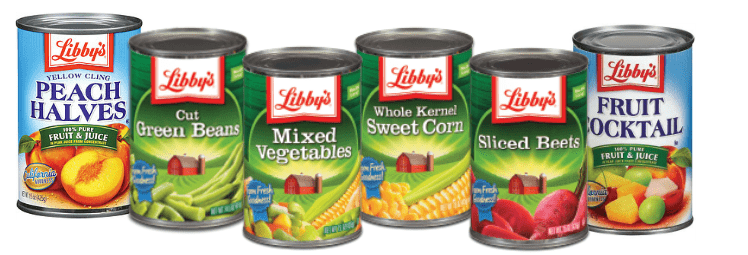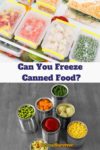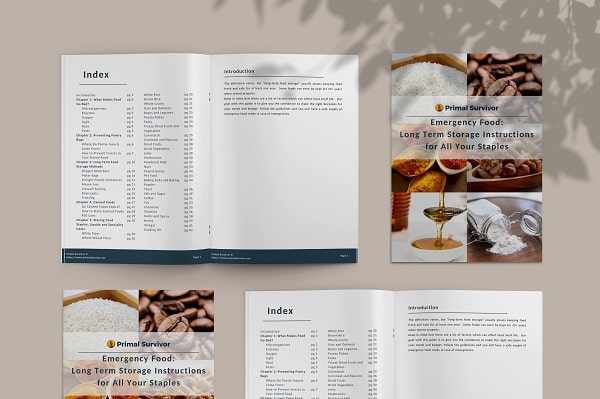Canned foods have a long shelf-life, making them an obvious choice for emergency survival food.
If you’re trying to survive a winter in North Dakota or Maine, where the temperatures in winter often drop below freezing, the chances of those products freezing are very high.
The last thing you want is to be stuck in the middle of nowhere with a pile of inedible canned foods, which is why it’s worth finding out if you can still eat frozen canned foods.
Maybe you could even extend the already long lifespan of tinned products by allowing them to freeze.
Read more about the shelf life of canned goods, canned foods for survival, and the best canned meats.
I stored some canned foods in the basement last year, and when February presented us with plummeting temperatures of -11℉, I had the opportunity to find out precisely what happens when canned foods freeze. It wasn’t pretty.
I will share with you some of the highlights and lowlights of that experience. I’ll also explore the potential dangers of freezing canned foods and what benefits there might be from doing so.
Can You Freeze Canned Foods?
No, Most canned goods aren’t safe to eat after being frozen. Some cans with low water content may be safe to eat, but each must be scrupulously checked for damage before consumption (more on this below.)
While some of the cans I had stashed away survived the freezing experience, others produced some nasty surprises.
I can safely (or unsafely) say that you should never allow carbonated drinks to freeze unless you enjoy dashing around the room trying to avoid a rocket-like missile that seems intent on knocking you unconscious.
On the other hand, a frozen can of Spam remains surprisingly tasty after such an ordeal. That’s because, although Spam contains some water, it’s not swimming in liquid like canned fruit or vegetables.
Read: How long does Spam last
Can You Freeze Canned Fruit and Vegetables?

Cans containing a lot of liquid, like soups, tinned pineapple, or canned tuna, don’t survive freezing well.
As water expands when frozen, it strains the can, compromising the airtight seal and causing the can to bulge.
If the seal breaks, it exposes food inside to air, creating the perfect environment for bacteria to flourish. This process leads to all manner of unpleasant food-borne illnesses, ranging from mild stomach aches and diarrhea to potentially fatal diseases like botulism.
Botulism is caused by a bacteria known as Clostridium botulinum, which needs only a little oxygen to thrive. This type of bacteria produces no noticeable taste or smell, so it is virtually impossible to detect – until you’ve eaten it. Even a tiny mouthful of food containing this bacterium could be deadly.
To establish if your canned foods are still safe to eat, you need to be scrupulous in your inspection.
Follow these tips to avoid eating canned foods that might cause an upset stomach or worse:
- Check the seal of the can for any breakages. If there are any, discard the can and its contents.
- Open the can to see if the food is still frozen. It’s still safe to eat if it is, but you should defrost it first.
- If a can leaks, the seal is compromised, exposing the contents to air. Again, these should be discarded.
- If the seal of the can has rusted or deteriorated, don’t eat the contents.
- A bulging can suggest that there are bacteria inside. As the bacteria grow, it releases a gas, causing the can to expand. The contents of any bulging can should be considered unsafe for human consumption.
- If, upon opening the can, you detect any unpleasant odors, throw it away immediately.
Canned fruits and vegetables have a high liquid content, which means they freeze at a lower temperature and expand as they do so.
Canned foods which don’t survive freezing well include:
- Asparagus
- Beans
- Corn
- Mushrooms
- Peaches
- Pears
- Pineapple
- Salmon
- Tomatoes
- Tuna
At What Temperature Do Canned Foods Freeze?
The freezing point of canned foods depends on the contents. Those with a high water content will freeze when the temperature drops to 32℉.
Milk-based products like evaporated or condensed milk are slightly more resilient, freezing only when the temperature hits 31℉.
Soft drinks are hardier still and freeze only when the temperature drops to 30℉. Many survivalists will be delighted to hear that beer can survive in surprisingly cold temperatures without freezing. Only once the temperature drops another few degrees, hitting the 27℉ mark, will beer freeze and potentially explode.
Do Canned Products Explode When Frozen?
As mentioned earlier, carbonated soft drinks are the most unstable when frozen.
When the seal breaks or the top of the can pops off, the contents of the can will spray out violently, causing the can to shoot around the room like an out-of-control pocket rocket.
Conclusion
If you plan to add canned foods to your emergency survival stash, you might want to think again, especially if you live in a cold climate.
Few canned products are suitable for human consumption after they’ve been frozen, and eating them is liable to have unpleasant or even fatal consequences.



But can you freeze the food after taking it out of the can? Say I open a big can of peaches – can I freeze half for later use in a ziploc bag if I pour it out of the can first?
Yes, you definitely are able to freeze food once it is out of the can.
You say:
“Some of the most difficult canned foods to freeze are:”
And list Beans.
What do you mean by this?
They should not freeze, don’t freeze or are no good if they freeze? (In the context of the rest of the article)
Thanks
I’ve updated the article to be clearer. Basically, any food with a lot of water in it will not survive freezing — the seal on the can is too likely to break.